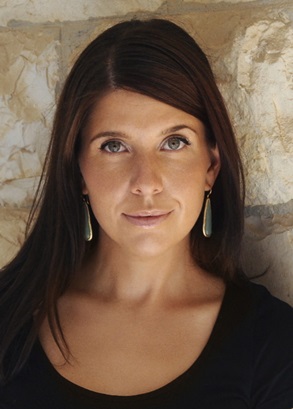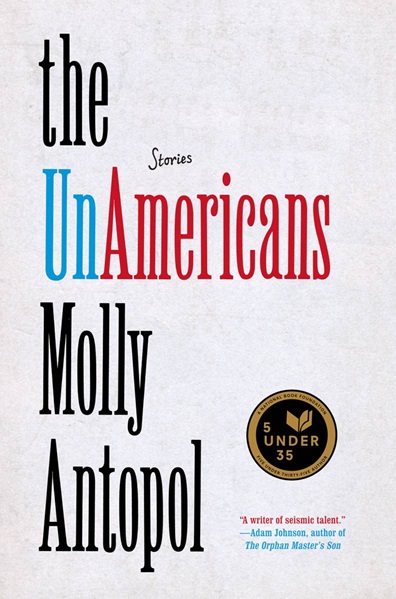Meet Molly Antopol, Author of “The UnAmericans”
by Sarah Hojsak
May 4, 2023

Molly Antopol has always been a storyteller. Before her first book, “The UnAmericans,” was published in 2014, she spent years writing countless short stories, just for the sake of learning how to write.
“I basically told myself that what I needed to do was write with blinders on—write and write and write, and throw everything away, and write and write and write some more—until I was really, really ready to put my work out in the world,” explained Antopol.
The stories she wrote during that time may never have reached a wider audience, but they helped Antopol perfect her craft. This approach paid off—“The UnAmericans” was nominated for the National Book Award and received numerous accolades including a National Book Foundation 5 Under 35 Award, the New York Public Library’s Young Lions Fiction Award, the Berlin Prize, the French-American Prize, the Ribalow Prize and a California Book Award Silver Medal.
The stories in “The UnAmericans” are deeply rooted in their sense of time and place, inspired by Antopol’s Eastern European Jewish heritage, her family’s involvement in the Communist Party and her own time spent in Israel. “I'm very aware of the fact that there's always going to be this thin piece of glass between me and these places, which is a really interesting thing for me to think about as a writer,” Antopol said.
Antopol will present a reading and workshop on Tuesday, May 9 as part of the Drexel Writing Festival. Learn more about her in the Q&A below and find more information on the Drexel Writing Festival here.

Why did you decide to publish a collection of short stories as your first book?
Short stories have always been my first love. My mom says that even when I was a little kid, she would find me writing my way into the stories I was reading. They really are my first love and, in some ways, my great love, so I knew that the first book that I would put out into the world would be stories.
I actually wrote another book when I was in graduate school, and in a lot of ways, I consider that my zero-draft book, where I learned the technical skills I needed in order to write the stories that I wanted to write. I felt like I really needed to practice and write story after story after story to figure out how to gain that skillset. Two of those stories made it into “The UnAmericans,” but everything else was shelved, never to be looked at again. The point was just to learn how to write.
How does the experience of writing a novel differ from writing short stories?
It's really different. I’m eight years into the novel. The pandemic slowed down my productivity because, like so many people, I had little kids at home and had to move all of my teaching online. But I think even without the pandemic, this book would take me a long time because it's the first novel I've ever written. I’m learning a whole different way to look at structure and arc. This novel has three different points of view, so that's a very different thing than my short stories where each only had one protagonist. It feels like another animal in every way.
Many of the stories in “The UnAmericans” were inspired by your own family history. Is that still something that inspires your work? What are some other things that inspire you?
My work is sometimes inspired by family lore or family history, but my characters aren't based on any of the people. I kind of have a pact with my family that I won't ever write about them. I don't even know how to do that, because when I'm writing fiction, I don't have total control over my characters sometimes—they just become these different people.
But I am endlessly fascinated by my family's involvement in the Communist Party and in the Cold War. I think I will always be deeply interested in the Eastern European village of Antopol, from which my last name derives, which was essentially decimated by the Holocaust. When writing my first book, I turned again and again to the town's Yizkor book, which is a collection of documents and oral histories from people who survived the war and wanted to share their memories and experiences of living there.
The third place that I will probably be fascinated with for the rest of my life is Israel—it's a place I've spent so much time. I worked with an Israeli-Palestinian nonprofit there, I worked with Russian and Chechen immigrants in a youth village, I worked as a program coordinator for an environmental nonprofit. All of these experiences were so interesting and so important to me. It's a place that I feel I'll spend my whole life trying to understand.
As a professor, what do you like best about working with students?
I love the balance between the solitary experience of sitting alone in a room for hours working on a book, and then getting to be present with a group of smart and engaged people who care about sentences and language and characters. It's the most inspiring experience to be in a workshop with students and talk about fiction in such a deep and focused way. I've had this experience so many times where I will bring in a short story or an essay that I've read 20 times and think I have exactly the right way to teach it, and a student will bring in a new perspective that is so fresh and so surprising that it just cracks the piece completely open for me in a new way.
Teaching keeps me in check as a writer. It's much easier for me—probably for many of us—to give someone else advice than to take it for myself. If I'm talking with a student about their short story, I'm able to see exactly what might work for them to take the piece to the next level. It's good for me to remember to take that same advice for myself when I leave the classroom and go back to my own book.
What advice would you give students who hope to publish their own work?
I waited a really long time to publish. My book was so important to me, but I didn’t know what was going to happen with it. I didn’t know if anyone was going to want to publish it. I didn't know if anyone who read it was going to like it. Those are the things I couldn’t control. The only thing that I could control was making it the exact book that I wanted it to be. And for me, that took an incredibly long time.
If there's a way not to take rejection personally, that can be really helpful. There's so much rejection involved, and I don't think it ever ends. What helps me is to not take the rejection personally and instead focus on having faith in my characters and the book itself. Oftentimes when I'm starting a project, it's hard for me to muster the faith that I can actually pull it off, that I can actually write the book that I want to write. For me as a writer, it's about spending so much time with my characters and with my research that I start to believe in my characters and in the book I want to write, even if I don't quite have faith in myself or know how I'm going to pull it off. That's what keeps me going.